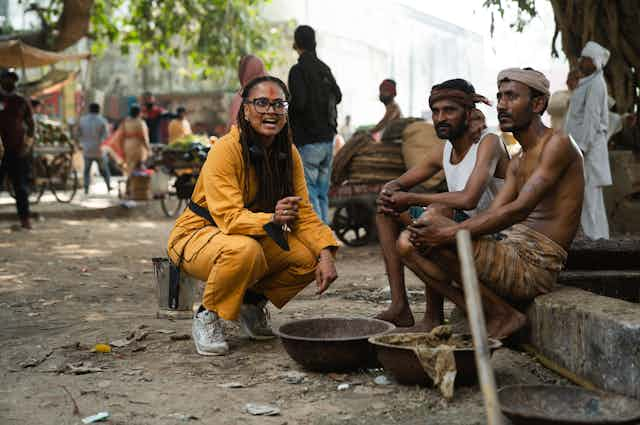Origin, the latest film from acclaimed director Ava DuVernay (Selma, When They See Us), depicts marginalisation as a thread that connects race, class, caste and gender. It is inspired by Isabel Wilkerson’s 2020 book, Caste: The Origins of Our Discontents.
In the film, Wilkerson (Aunjanue Ellis-Taylor) sets out on a global journey to explore the concept of “caste” as she writes her book and grapples with personal loss. She visits three countries as part of her research.
First, she explores the elements that give rise to discrimination in her home country, America. Next she goes to Germany, where she connects the racial segregation of people during the Nazi era to America. Finally, she travels to India, where she connects the plight of Dalit people in a caste-based, divided society to that of black people in America and Jewish people in Germany. What she creates is a book that fundamentally exposes the insidious and global nature of caste systems.
Caste is a system of classifying society in a hierarchical order in which some people are kept inferior and others superior. In India, Dalit people have been placed at the lowest rung on this social ladder, in America, black people and in Germany, Jewish people.
It’s the way DuVernay weaves these stories together that makes the film so outstanding. In doing so, she highlights how inhuman, unethical and unjust discriminatory practices happen irrespective of geographical location, local cultures and social norms.
Dalit stories in Hollywood
I come from a Dalit background and I research Dalit representation in film. So I know first hand Origin’s importance to people like me.
In the film, Wilkerson visits the Dr Ambedkar National Memorial in Delhi to learn about the lawyer and social activist’s life and work. This is the first time that Bhimrao Ramji Ambedkar’s fight for the rights of India’s Dalits and other deprived classes has been portrayed in a Hollywood film. Origin traces the journey of Ambedkar (played by Gaurav J. Pathania) from his childhood to writing the Indian constitution.
Ambedkar, revered as Babasaheb (Respected Father), was born in India in 1891. At that time, people were treated differently depending on their heritage. Imagine a big ladder, with some people at the top getting all the entitlements, and others stuck at the bottom, never getting a chance to climb up. Ambedkar was a Dalit born at the very bottom of this ladder, in a group called the “untouchables”.
Despite facing many obstacles in school – such as having to study sitting on a mat outside the classroom and eat his food separately – Ambedkar was determined to pursue education. He was intelligent and studied hard, eventually going to college in the US and England.
He became an expert on laws and rights, and when India gained independence, he was chosen to write the constitution. Ambedkar made sure that it included rules for treating everyone fairly and equally, no matter where they stood in the social hierarchy.
Origin and caste
Using extreme close-ups, DuVernay shows Wilkerson’s inner turmoil as she learns more about India’s caste system. At times, the film has an almost documentary style, which gives it a feel of authenticity as Wilkerson interviews people, discussing and debating the issue of caste while highlighting the complexity of the subject.
Origin doesn’t shy away from topics like untouchability. For thousands of years, Daalit people have been excluded from all forms of amenities and educational opportunities, and denied the right to read and write.
In one scene, the film depicts the practice of manual scavenging, the work many Dalit people undertake to make a living. In the past five years, 339 people have lost their lives doing this kind of work, cleaning sewers and septic tanks.
The scavenging is shown with brutal honesty and empathy, avoiding unnecessary sensationalism or dramatisation. It compels viewers to confront the shocking reality that this inhumane practice persists in our supposedly modern world. The character of Wilkerson acts as a powerful catalyst, opening the eyes of audiences around the world to this hidden and often unbelievable cruelty.
Another incident shows a father in the US who, in a bid to escape the trauma and humiliation of the caste system, named his firstborn daughter “Miss”. He sees this as a loophole in the social system, hoping that by giving her this title, he can indirectly grant her the respect denied to their ancestors.
This echoes other stories from the real world. In India, names indicate a person’s position in the social hierarchy. Generally, Dalit names are derogatory. In a tragic incident in 2022, a father in Rajasthan named his daughter “Baisa” (which means “Miss” and is used to convey respect, power and authority to the daughter of the upper-caste Rajput community), a choice that upper-caste people strongly disapproved of. As a result, he was beaten to death.
Despite the darkness of its subject matter, Origin doesn’t only expose the problem of marginalisation, it also offers a glimpse of hope and possibility. By showcasing acts of resistance, resilience and solidarity, the film encourages viewers to become active participants in dismantling systems of oppression and building a more equitable, caste-free future – one based on equality, fraternity and liberty.

Looking for something good? Cut through the noise with a carefully curated selection of the latest releases, live events and exhibitions, straight to your inbox every fortnight, on Fridays. Sign up here.

